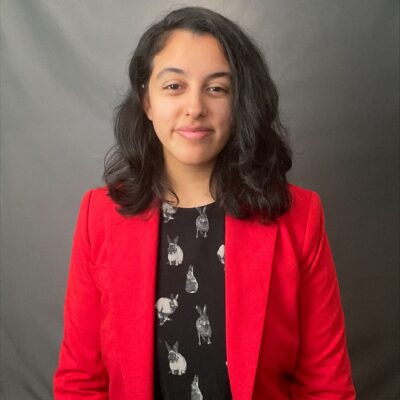Student Spotlight: Katherine Ally Zaslavsky

April 22, 2024
Katherine Ally Zaslavsky is a doctoral candidate in sociology from Endwell, New York. They earned their B.A. from SUNY Geneseo and now study the value of representation under the guidance of Landon Schnabel and Filiz Garip at Cornell.
What is your area of research and why is it important?
I study the value of representation. When people think of representation, they usually think of democracy: a system where you elect people to positions of power to act in your interest. But representation is everywhere. It’s in the names of our buildings, the way our land is divided, and, of course, our politics. Unfortunately, that means our representations can be skewed, erased, and even exploited. What would it mean for us to exist in a world where our expression speaks for ourselves—and what would it take to make that a reality?
What are the larger implications of this research?
Representation is everywhere. Take Hollywood press tours—we love watching creators hang out with puppies and talk show hosts, get into the weeds on roundtables, and show off their looks on Instagram. But of course, they’re doing this to promote their new projects and the entire franchise that goes with that. They’re representing the studios by representing themselves. Celebrities have also started speaking out more on politics, using the awareness they wield to bring up (or ignore) issues. It’s not just celebrities: it’s CEOs, politicians, influencers, academics, and students who are defining an era where awareness is a form of currency.
What does it mean to you to be a Bouchet Scholar?
Being a Bouchet Scholar is about honoring the legacy of change for good. The Bouchet Honor Society was founded to commemorate Dr. Edward Alexander Bouchet, the first African American to earn a doctorate in the U.S. Dr. Bouchet understood that holding true to an organization’s mission does not mean resisting change. It means grounding our expression in striving for better and not letting our past hold us back. To be in the Bouchet Society is to bring the spirit of science into every part of life: that is, welcoming knowledge that shows us we were wrong, because it brings us closer to the truth.
How do you exemplify the five pillars of the Bouchet Society—character, leadership, advocacy, scholarship, and service?
My connection to the pillars of the Bouchet Society is grounded in my community—students who bring their full humanity to education. We live in a world where we have only recently gained the power to represent ourselves directly, and no one is grappling with this newfound power more directly than students. The pillars of the Bouchet Society remind us that everyone is human: we’re messy, complicated, and often contradictory. And that’s okay! That’s reality. The danger is when we reduce people, ideas, and issues to one-dimensional representations. It robs them of their humanity, and it robs us of ours.
President Pollack has designated this academic year’s theme as freedom of expression. What does freedom of expression mean to you?
Freedom of expression is a precious thing, but it should not be defined by its scarcity. It’s a human right. We live in a world that limits many people’s freedoms, until entire swaths of society must fight for what they deserve. These limits are unequally applied, least among those who have money and power.
At Cornell, freedom of expression means reminding ourselves and our leaders that this isn’t normal. The world was built by people who took the power to build it. And it can be changed, if the people in power commit to that. Freedom of expression is a right, but power is a privilege.
What are your hobbies or interests outside of your research or scholarship?
Outside of research, I like to watch TV shows for the 14th time. If studying media has taught me anything, it’s that the real revelations from Gregory Eddie’s side-eye come on the double-digit rewatches. Otherwise, my time goes toward cooking, cats, and getting lost on long car rides.
Why did you choose Cornell to pursue your degree?
I chose Cornell because it knows its place in the world. Having a voice at Cornell means having a voice infused with the power and reputation of generations. My greatest mentors here are people who know what this means: that we must understand how Cornell accessed this power, where its resources come from, and where they go. They taught me that we keep our eyes on the truth, because that truth will show us how to use our power to make a better world. An institution that’s committed to “any person, any study” is on the forefront of this mission.
